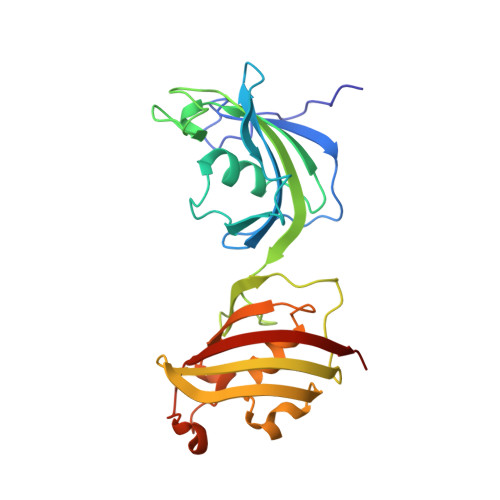Crystal Structures of the Free and Ligand-Bound FK1-FK2 Domain Segment of FKBP52 Reveal a Flexible Inter-Domain Hinge.
Bracher, A., Kozany, C., Hahle, A., Wild, P., Zacharias, M., Hausch, F.(2013) J Mol Biol 425: 4134-4144
- PubMed: 23933011
- DOI: https://doi.org/10.1016/j.jmb.2013.07.041
- Primary Citation of Related Structures:
4LAV, 4LAW, 4LAX, 4LAY - PubMed Abstract:
The human Hsp90 co-chaperone FKBP52 belongs to the family of FK506-binding proteins, which act as peptidyl-prolyl isomerases. FKBP52 specifically enhances the signaling of steroid hormone receptors, modulates ion channels and regulates neuronal outgrowth dynamics. In turn, small-molecule ligands of FKBP52 have been suggested as potential neurotrophic or anti-prostate cancer agents. The usefulness of available ligands is however limited by a lack of selectivity. The immunophilin FKBP52 is composed of three domains, an FK506-binding domain with peptidyl-prolyl isomerase activity, an FKBP-like domain of unknown function and a TPR-clamp domain, which recognizes the C-terminal peptide of Hsp90 with high affinity. The herein reported crystal structures of FKBP52 reveal that the short linker connecting the FK506-binding domain and the FKBP-like domain acts as a flexible hinge. This enhanced flexibility and its modulation by phosphorylation might explain some of the functional antagonism between the closely related homologs FKBP51 and FKBP52. We further present two co-crystal structures of FKBP52 in complex with the prototypic ligand FK506 and a synthetic analog thereof. These structures revealed the molecular interactions in great detail, which enabled in-depth comparison with the corresponding complexes of the other cytosolic FKBPs, FKBP51 and FKBP12. The observed subtle differences provide crucial insights for the rational design of ligands with improved selectivity for FKBP52.
Organizational Affiliation:
Department of Cellular Biochemistry, Max Planck Institute of Biochemistry, Am Klopferspitz 18, 82152 Martinsried, Germany. Electronic address: bracher@biochem.mpg.de.















